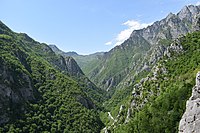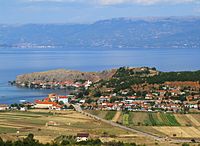World Heritage in Albania
World Heritage Sites in Albania yellow = world cultural heritage green = world natural heritage red = mix |
The world heritage in Albania (as of 2019) includes four UNESCO world heritage sites , including two world cultural heritage sites, world natural heritage sites and a mixed site. Albania ratified the World Heritage Convention in 1989, and the first World Heritage site was added to the World Heritage List in 1992. The last World Heritage site to date was registered in 2019. It is an extension of the North Macedonian part of Lake Ohrid.
World heritage sites
The following table lists the UNESCO World Heritage Sites in Albania in chronological order according to the year of their inclusion in the World Heritage List (K - cultural heritage, N - natural heritage).
![]() Map with all coordinates of the World Heritage Sites: OSM
Map with all coordinates of the World Heritage Sites: OSM
| image | designation | year | Type | Ref. | description |
|---|---|---|---|---|---|
|
Butrint ( location ) |
1992, expanded in 1999 | K | 570 | Butrint is an ancient ruin site. The oldest finds date from between the 10th and 8th centuries BC. BC Kalivo was a Bronze Age high fortress nearby; this was probably in the 12th century BC. Created. | |
| Historical centers of Berat and Gjirokastra | 2005, expanded in 2008 | K | 569 | The city of Gjirokastra ( Lage ) lies on a rock and was probably already in the 3rd century BC. Settled. Berat ( Lage ) is one of the oldest cities in Albania. | |
| Old beech forests and primeval beech forests of the Carpathian Mountains and other regions of Europe | 2017 | N | 1133 | Transnational World Heritage with Belgium, Bulgaria, Germany, Italy, Croatia, Austria, Romania, Slovenia, Slovakia, Spain and Ukraine. In Albania, these include the Lumi i Gashit ( Lage ) nature reserve in the Albanian Alps and the Rrajca ( Lage ) area in the Shebenik-Jablanica National Park . | |
|
Natural and cultural heritage of the Ohrid region ( location ) |
2019 | K / N | 99 | Extension of the existing World Heritage natural and cultural heritage of the Ohrid region on the north Macedonian side of the lake to include the Albanian part of the lake due to the ecological importance of Lake Ohrid and the remains of pile dwellings , to the village of Lin with an early Christian church, to an untouched stretch of shore north of Lin and around the Source of Drilon . The buffer zone includes the basin of the lake with Pogradec (Illyrian remains and old town) and other cultural and natural monuments. |
Tentative list
The sites that are intended for nomination for inclusion in the World Heritage List are entered in the tentative list . As of 2019, four sites are entered in the tentative list of Albania, the last entry was made in 2017. The following table lists the sites in chronological order according to the year they were included in the tentative list.
![]() Map with all coordinates of the World Heritage candidates: OSM
Map with all coordinates of the World Heritage candidates: OSM
| image | designation | year | Type | Ref. | description |
|---|---|---|---|---|---|
|
Tombs of Selca e Poshtme ( location ) |
1996 | K | 909 | Illyrian graves from the 6th - 5th centuries BC Chr. | |
|
Amphitheater of Durrës ( location ) |
1996 | K | 910 | Largest amphitheater on the Balkan Peninsula with an early Christian chapel.
|
|
|
Ancient city of Apollonia ( location ) |
2014 | K | 5885 | The city of Apollonia was founded in 588 BC. Founded as a Doric colony by Corfu with the participation of settlers from Corinth. For almost a thousand years, Apollonia was an important urban center in the Epirotian area. It is named after the god Apollo. | |
|
Bashtova Fortress ( location ) |
2017 | K | 6259 | The only fortress from the Venetian period in the area that was not built on the basis of older fortifications. |
Web links
- Albania on the UNESCO World Heritage Center website.
Individual evidence
- ↑ Albania. In: whc.unesco.org. UNESCO World Heritage Center, accessed July 22, 2017 .
- ^ Tentative list of Albania. In: whc.unesco.org. UNESCO World Heritage Center, accessed February 12, 2018 .









